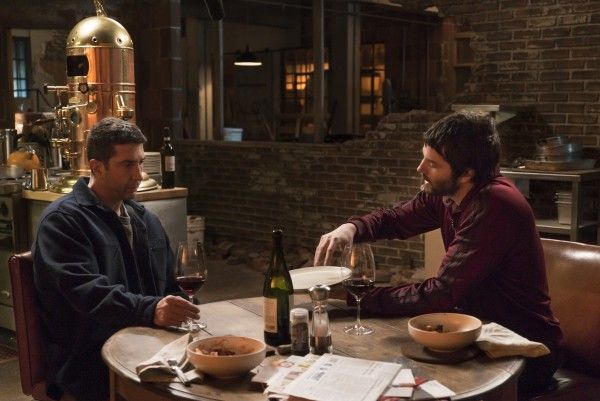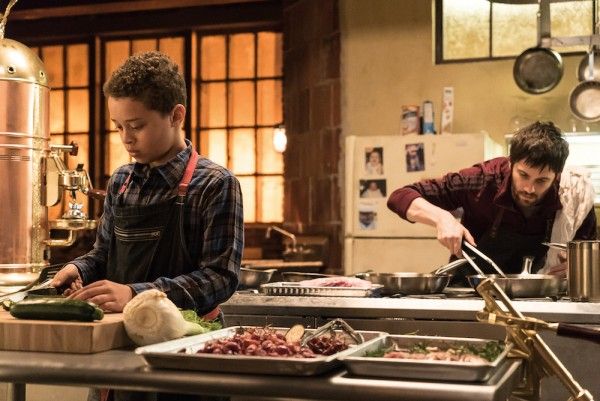You can see the conceptual appeal of Feed the Beast right away. People love cooking shows — I mean love cooking shows — so why not make a scripted series about cooking and the restaurant world? This gets to the heart of everything that is right and wrong with AMC’s new series Feed the Beast. It has a great ideas, but it doesn't know how to compile them. It’s a show about restaurants, to an extent … but it’s also a show about the mob, the police, family drama, grief, and starting up a small business.
Feed the Beast focuses on two lifelong friends in the Bronx: alcoholic Tommy (David Schwimmer), a sommelier whose wife was killed in a hit and run a year ago, and whose son TJ (Elijah Jacob) has refused to speak since then; and coke addict Dion (Jim Sturgess), a talented chef who is freshly out of jail, and already in deep with the mob and the police. That’s a lot of baggage to throw at a viewer immediately, and a lot of darkness in what often feels like a quirky comedy trying to break out of its dour setup. But like these two working-class guys looking to make good on their dream of starting a high-end restaurant, the show features many different dichotomies that never fully reconcile, leaving its tone and direction muddled and uncertain.
The most compelling part of Feed the Beast is the restaurant startup itself. Though the series tries to fill out the characters who surround Dion and Tommy on their quest — John Doman as Tommy’s rich, racist father, Lorena Izzo as Tommy’s potential love interest and restaurant manager (a job she pretends to have experience with to keep close to him), and a devilishly smarmy Michael Gladis as the feared mobster “The Toothfairy” — nothing is as interesting as the inner workings of Thirio (meaning “beast”), the central duo’s dream eatery. The compromises they have to make in setting up the restaurant are vaguely reminiscent to another small-business series, Silicon Valley, although to its detriment Feed the Beast cruises past details that Silicon Valley relishes in as both plot drivers and comedic fodder.
It also takes awhile to really care about what happens to selfish Dion and wet-blanket Tommy, who are fairly boring and unlikable guys (Schwimmer is flat and Sturgess is restless, which balances out a little only when together). Things pick up once Dion ends up acting as a kind of surrogate mother to TJ, and his odd-couple dynamic with Tommy improves over time. The show also smartly includes TJ in meaningful ways that are augmented by his silence. It’s quirky but it never feels gimmicky, and it may have actually solved the long-running TV problem of how to incorporate kids into an adult story.
That adult story, though has some issues, and seems to lose track of its own continuity pretty quickly. Tommy’s alcoholism and trips to his deceased wife’s grave (where he lies to her about current events) are fast forgotten, and ancillary characters are inserted awkwardly in ways that feel like they should matter, but ultimately don’t. Is it funny? It is serious? Is this about fine dining and pretension, or about two blokes cooking and drinking in the Bronx? Do we care?
Feed the Beast — which could have been titled “Money Problems” — is yet another Danish series questionably translated for American audiences, and also the kind of series that you may need to invest many hours into before it starts to pay off. In the land of Peak TV, that’s not an easy thing to ask of viewers, and it’s also not a sure bet. Tommy and Dion want so much for their lives and for their dreams of Thirio, but making it happen is a messy and scattered process. The same is true of Feed the Beast.
Rating: ★★ Fair — Only for the dedicated
Feed the Beast premieres Sunday, June 5th after Preacher on AMC, and will move into its regular Tuesday night slot starting June 7th.






